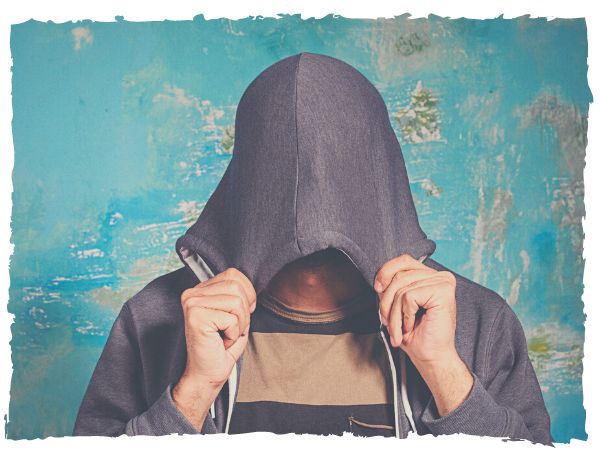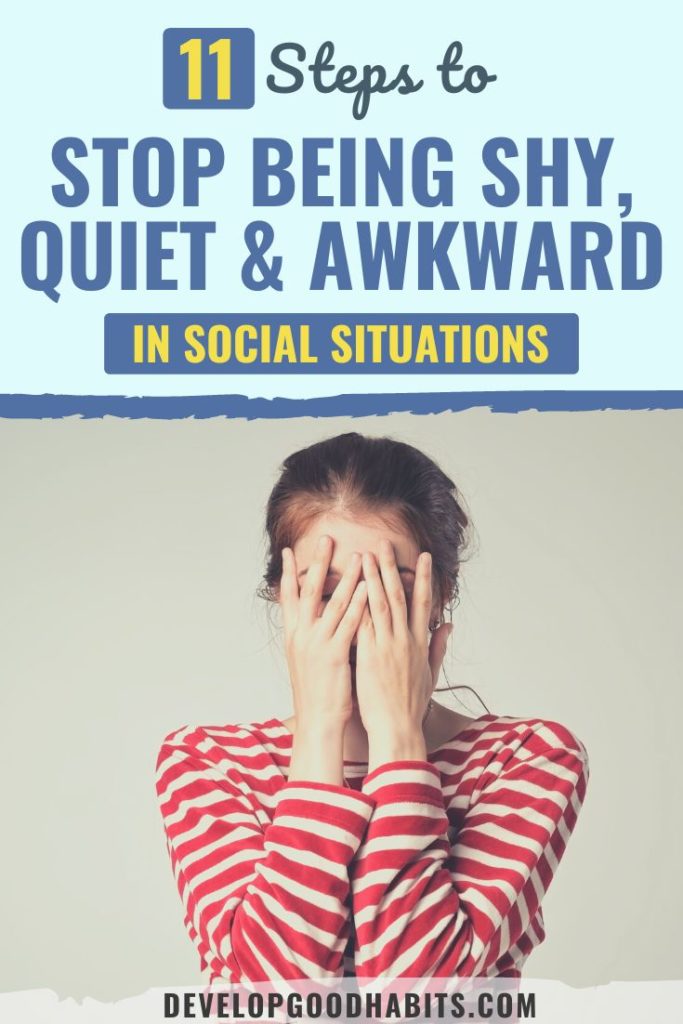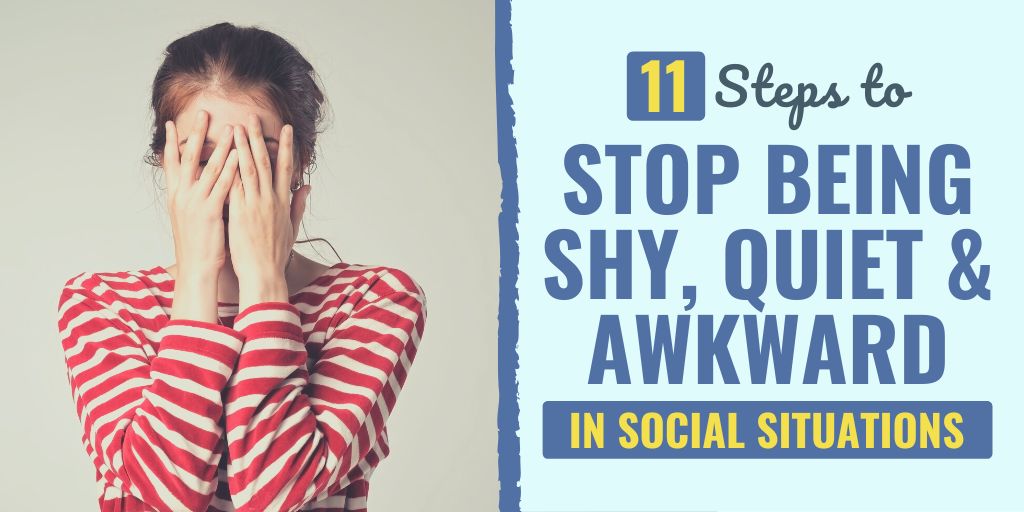Here we go again—another social gathering, and yet another opportunity to be shy and feel really awkward again, right? If you fear social gatherings, hate attending meetings, and feel like your left foot is firmly stuck in your mouth when you have to mingle… this is the article for you.
There’s nothing wrong with being socially shy, but it does limit your opportunities to network and build strong connections with people. The real issue is that it’s virtually impossible to avoid people and social settings, so you suffer extreme discomfort and feel foolish each time you have to attend a gathering.
Is it possible to unlearn shyness? It is. So here’s the ultimate guide on how to retrain yourself to be less shy and more assured in social situations.
What Is Shyness in Social Situations?
Shyness in social situations is when you feel awkward, out of place, and embarrassed in social circles. While other people mingle easily, you feel utterly confused and ashamed. You don’t know what to say, who to talk to, and how to make a connection, and you feel as if you want the ground to open up and swallow you right now.
Of course, shyness is often accompanied by physical symptoms like heart palpitations, sweating, stuttering, and headaches. Just think how many times you were supposed to meet friends only to call (ahem, text) them and cancel because of a headache. Was it really a headache from a long day, or did you start feeling sick when you thought of going out in public with more than one person?
Psychologists may diagnose you with something called social anxiety depression(SAD), and this is indeed a sad problem. It’s when you suffer from symptoms of anxiety, when you have to attend social situations. It doesn’t really matter if you are going out with people you know or meeting complete strangers for a work function—you feel like you’re dying and become depressed.
Hot flashes, trembling extremities, stomach upsets, high blood pressure, feeling faint, suffering with shallow or extremely fast breathing, and confusion are just a few more of the symptoms you may experience if you are socially shy.
Because you don’t feel like you belong, you end up swallowing your words, internalize yourself, and become very quiet. Like a mouse, you creep among the other people (who all seem to have a great time) at a social event. You probably wonder what is wrong with you. Everyone else mingles so easily, why can’t you?
Shyness Is Caused By…
You may believe that shyness is your nature—it isn’t. There’s no genetic root cause for shyness—it’s your temperament and shouldn’t be your default behavior. Social shyness is the result of many complex emotions and past events that all add up to making you feel shy and awkward when you are in a social or public situation.
Understanding the causes of social shyness can help you overcome it and thrive in social settings (or at least survive it better).
Chances are if you are shy, your parents or a family member you spent a lot of time with is also shy. You learned how to behavein social settings from this person. Whether it was Christmas meals with the whole family there or holidays with friends, you saw how they handled being in a group, and you identified with their awkwardness, manifesting it in your own behavior repertoire.
Anxiety and fear are twin emotions we experience. When you have an amygdala that responds with a powerful fear response each time you are in a new or strange or social situation, you may develop anxiety and shyness as a result. This is why some antidepressant medication that controls the amygdala may help.
The fear response may also be fueled by past experiences. If you never learned to trust your world or your ability to cope in new and stressful situations, you are likely to develop anxiety and shyness.
Not trusting your world, you become quiet, and your instincts take over. Being quiet is an almost primitive instinct, and like a prey animal that cowers and keeps still until a predator has cleared out of the area, you keep quiet, hoping that the cause of your fear (the predator) has left.
The problem is, the predator doesn’t exist—it’s a primitive side of your brain acting out because of uncertainty. A past experience such as being bullied as a child may contribute to distrusting your environment or social groups.
A Better Life
Shyness when you are in a social setting and feel awkward can be a symptom of deeper underlying issues with your self-esteem, negative self-talk, and lack of social skills. When you finally learn how to manage social settings without feeling awkward and shy, you give yourself a much-needed boost and develop better skills for future socializing.

Learning to stop being shy and feeling awkward is how you will find your voice and break the silence. Being able to socialize effectively is an important life skill, and if you don’t learn to speak in public or mingle easily, you will limit your growth opportunities as you’ll be seen as weak and cut out of conversations.
Don’t despair, though. Shyness can be unlearned, and you can develop the skills to overcome fear and anxiety, letting you relax more as you discover that you do have some social shoes too.
Stopping Shyness
Stopping shyness and banishing awkwardness in social settings is a process. There’s no magical cure-all panacea that you can take. It’s a systematic process of rebuilding your social abilities and reducing your anxiety triggers. There will be successes and failures, but with persistence, you will reach a level of comfort when you need to interact socially.
Think of it as a 12-step program of breaking down fears and building courage as you become a more social and relaxed version of yourself. These steps can be used interchangeably, and you can pick different steps as you feel more able to do them.
Don’t worry about being “successful” at socializing; instead, just do it and learn from each experience. Revisit steps as needed, and make the process your own.
Step 1. Start With Who You Know
The fear of the unknown is often what fuels social anxiety and results in shyness when you have to socialize in large groups of people you don’t know well. Choosing a few people you do know can help you focus and have a purpose.
Top secret alert! This is what most people do when they are in a large group—they look for familiar faces and interact with these people first. This is also a basic tenet of the learning process—moving from the known or familiar to the unknown or unfamiliar.
By talking to people you do know first and then meeting new people these familiar people know, you broaden your knowledge base and end up with more people you do know and can socialize with next time you go out.
Action Item: Before you attend a social event, try to find out who you know will be attending. When you know that there are people there who will be familiar to you, it becomes easier to get yourself motivated to attend. After all, these are people you have spoken to before, so you don’t feel as awkward to speak with them again.
Familiar faces help make foreign waters seem less dangerous and lowers your anxiety levels.
Step 2. Fill Your Arsenal
At a gathering where there are strangers, you will probably feel overwhelmed. Try to find out who will be going, what type of jobs they have, and what they may be interested in. Obviously, make sure these interests are socially acceptable topics for conversation.
Now it’s time to line your arsenal walls with conversation ideas. Prepare in advance so you have something to start a conversation with a stranger. When you are prepared, you will feel less awkward and more relaxed.
Different things you can find opening lines on can include giving a complement, asking a question, or making a comment to draw feedback. Keep the ball moving by using open-ended questions or remarks that don’t have a simple “yes” or “no” answer. When you get the other people to respond, it places the ball in their court, which takes pressure off you.
Action Item: Read up on some conversation starters or interesting topics before an event you are attending. Keep a few short notes on what to talk about with each topic and pop these into your pocket. When nobody is watching, you can check your notes.
Step 3. Breathe
Since shyness is a symptom of anxiety, you probably stop breathing the minute you walk into a crowded room. Perhaps you know you do this, and you gasp for breath before you have to talk to someone. Not only does this make you look like a fish, but it also influences your ability to think clearly and respond appropriately.

By breathing naturally and ensuring your brain has enough oxygen supplied to it, you can force your amygdala to relax and suppress the fear instinct. Nervous people breathe poorly, so try a few breathing exercises to help calm your nerves.
Action Item: When you arrive at a venue or social gathering, take a few seconds to breathe mindfully. You can try a box breathing exercise like this:
> Inhale for four seconds.
> Pause for four seconds.
> Exhale slowly for four seconds.
> Pause for four seconds.
> Repeat as needed.
Step 4. Mirror Time
Social situations are often work-related. You may be required to give a speech, or you have to deliver a pitch at the event, and if you are shy, you probably want to vomit at the thought of speaking in front of people. The idea is worse than the actual talk, especially if you can’t see yourself being successful at it.
Practicing in front of the mirror can take the sting out of this experience.
Action Item: Using a full-length mirror at home, practice saying the speech you have to give or the pitch you have to deliver. Don’t look at anything other than your delivery, face, and overall body movement. It doesn’t matter if you are overweight or short or tall.
What does matter is whether you are fidgeting, if you look confident, or if you are showing fear. Are you stuttering, rushing through the lines, or fidgeting constantly? Note these problems and gently correct so you don’t do this again.
Step 5. Know Yourself
When you are shy, you probably think you’re not good enough. However, you are more than good enough. Knowing what your strengths are can help you feel more confident and able. Start journaling and keep a record of all the things you do well (because we tend to look at the negative and failures all the time, right?).
Focus on that strength, letting it grow by working at it. When you’re good at something, you become less “bad” at everything else. A confidence boost can do wonders to help you be less shy. Plus, having something you’re great at can help you develop a topic to talk about with others.
Action Item: In your journal, identify something you are good at each day. Do this for a week or even a month. Identify the things that repeat, such as being great at planning or knowing where to get the best specials, and then, build those to become even better.
Read up about these topics and become an expert on them. When you are in a social setting and feel awkward, wait for a cue to start a conversation about your talent item. Perhaps someone is talking about where to get the best pizza, so you can smoothly transition the discussion to cover where to get the best pizza ingredients, and how to make a delicious homemade pizza.
Step 6. Give It Time
Real shyness tends to fade once you know people better. You don’t have to lead conversations, and you don’t have to be afraid of raising an opinion or thought either. So give yourself time to listen, learn, and then join in conversations.
Within a few minutes, you will know a little about the people you are with, and you will feel less shy. Don’t rush blindly into conversations, and don’t bail on them either. Shyness takes a while to lessen, but it will if you give it time.
Action Item: Use the “five minute rule” when you are in a conversation group with people, such as colleagues, you know somewhat. The rule is that you’re not allowed to leave the conversation for at least five minutes. If, after five minutes, you feel that you’re not finding anything to talk about (and if it’s not rude), you can leave the conversation group.
With strangers, you may want to extend the time a little, especially if it’s a large conversation group.
Step 7. Find Your Motivation
When we do something because we knowit’s good for us, we tend to stick it out better than if we do it because we have to. Being shy in public and feeling awkward or suffering from silence can be detrimental to your health. You may find that you struggle to form connections, which can lead to loneliness or isolation.
Now you know that shyness isn’t good for you, it’s time to find what will motivate you to be more social and learn to be less shy. Perhaps you want to find a partner, or you’re hoping to build a social network that can support you in a business venture. Whatever your reason, find it. There is always a reason to be more social and less insecure.
Action Item: Once you know what your goals are, you will be more motivated. Identify what you want to achieve by going out socializing. Write about it in your journal, and find the reason for stepping outside your comfort zone. Focus on that reason.
You can even use a keyword to help you remember why you have to be strong and keep trying. Write the keyword on your palm or set a few reminders on your phone to go off during the evening. When you see a flashing reminder, you will be more likely to persevere.
Step 8. Get Out of Your Mind With Mindfulness
When you are nervous and shy, you probably run up some fears in your head. Your mind is telling you all the things that can go wrong, what people can or may think of you, and that you’re a failure. The best way to shut that negative inner monologue is to get out of your head by paying more attention to what is happening around you.

Listen attentively to what people are saying, really enjoy the conversations, and stop trying to think of something funny or perfect to say. When you become invested in the conversation, you will find it much easier to really get a foot in the door and have an appropriate comment, question, or complement to give.
Action Item: Practice mindful listening. When people around you are talking, take note of what they say, how they say it, and what the responses are to their words. Reflect on these conversations later in your journal.
Take care not to sit and gripe because you “don’t know how to speak so easily as they do.” Just listen, learn, and enjoy. With enjoyment comes relaxation, and that’s the ticket to having real conversations.
Step 9. Become Mindful of Your Narrative
Do you tell yourself that you’re the shy one in the conversational group? While you may have been shy at an event or in a situation in the past, you shouldn’t label yourself as shy. Our words have power. What we say to ourselves about ourselves tells us what we believe we are or should be.
By calling yourself the shy one, you are creating a self-fulfilling prophecy. You start to believe you are shy and awkward, when that’s not who you are, only what you experience. The best way to start noting how you talk to yourself is to actively listen to your thoughts.
Note what you are saying to yourself and change your narrative. Instead of thinking, “I am shy,” you could think “Talking in public doesn’t come naturally to me; therefore, I work at it and succeed in having discussions.”
Action Item: Keep a mind journal to help you record your thoughts. Note what themes recur in your mind. Write down the negative mottos you have been clinging to. Next, use positive affirmation to help you combat these thoughts in a simple replacement game.
When you think “I am so shy,” you can replace it with “I am learning to be confident in public.” This simple statement gives you power. Instead of suffering, you are doing something about it.
Step 10. Practice Self-Kindness
When you are already feeling awkward and ashamed of your apparent lack of social skills, you may quickly become harsh, echoing the voice from your past that had a hand in your initial shyness. Stop being harsh. You don’t need to be told to “get it together” or “stop being a wimp.” Instead, treat yourself like a best friend would by using words of encouragement.
Action Item: Technology is amazing, and you can use your phone to act as a random reminder of how amazing you actually are, to encourage yourself to relax, and to help you stay on target with socializing.
If you are your own best friend, what would you say to yourself in awkward social situations? How would you encourage yourself?
Set reminders to help you remember to be kind. An alarm every 20-30 minutes can tell you to breathe and smile because you are as good as everyone else, you are capable, and you are a great person to talk with.
Best of all, when those reminders come through, you will smile at the tidbit of kindness, and the smile will make you all the more inviting to others.
Step 11. Dress for Success
Shyness often manifests in person by making you wear dull clothes that make you drop off everyone else’s radar. You feel like a bulls-eye is on you, so you try to tone into the background and become invisible. This does absolutely nothing to make you more confident.
Start dressing to stand out a little; dress for success. You don’t have to pull an Austin Powers kind of vibe, but you should try to dress a little more interestingly.
If you really struggle with this, you can make use of the services of a shop assistant at a department store. Explain where you are going, what you want to achieve, and what you normally dress like. Then try on different outfits and have fun.
Action Item: Take note of how people who are successful at socializing dress up. Note the colors they wear, style of clothing, and how they show off their physical presence. Copy and use what appeals to you. After all, we all learn from someone else.
Final Thoughts on How to Stop Being Shy
Being shy is a challenge we all face. It’s not like we’re born as social butterflies. Some of us just master the skill much earlier, but it’s never too late. With these action steps, you can transform yourself into a more socially proficient person who can transcend their natural inclinations to be shy.
You were not born shy. Something happened to make you feel shy. That’s in the past now, and you have the power to redefine yourself as someone who may not always communicate easily, but who can connect and have a good time out in a group.
Learn more skills to help you develop social skills with the tips in our article on how to be more outgoing and talkative in social situations.



What a helpful article! You’ve really shed a lot of light on why we might feel shy. I love your point about labels and am always careful to avoid using labels with myself and those around me. We become who we think we are, right?
One of my favorite tips for small talk is to remember that people love to talk about themselves and the things they care about (family, hobbies, their dog, whatever). If you can tap into that, they’ll do all the talking! 😉
Thanks for a great article!
I believe that anything can be overcome with repeated exposure.
So say you’re a shy person and you get really nervous when you have to talk to a stranger, just do that more often.
Repeat that enough times throughout the day, week, months and the nervousness should go down by quite a lot, but maybe not completely gone.
It’s like taking a ride on a roller-coaster.
You’ll feel super anxious the first time you get on it.
But for subsequent times you get on it you probably won’t feel as anxious.
Sure, the anxiety is still there but it’s not as bad as the first few times.
The power of repeated exposure!